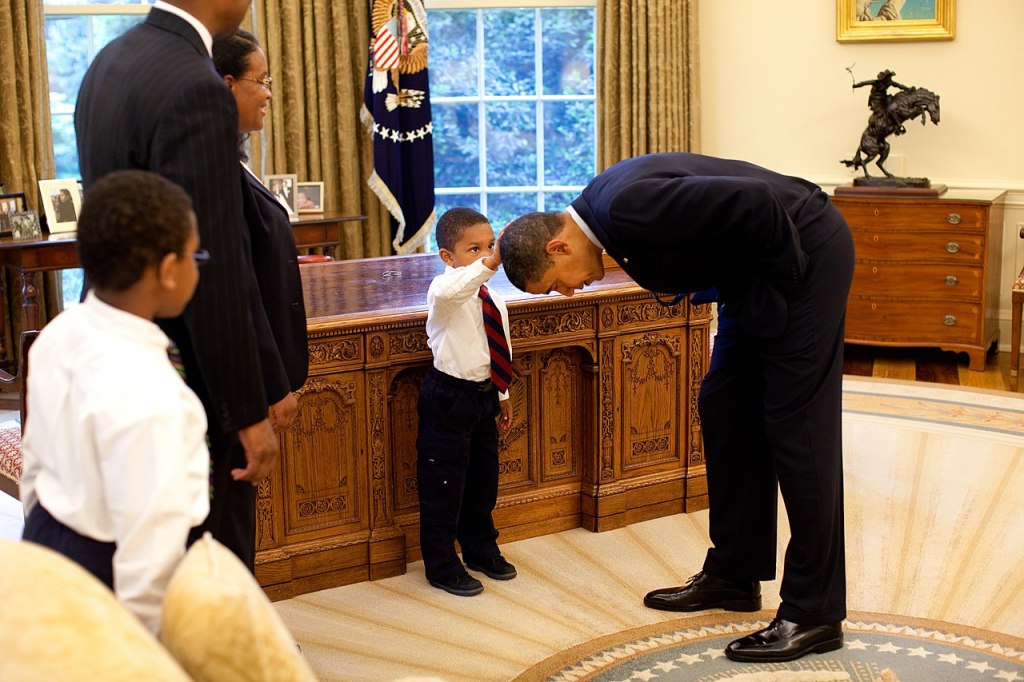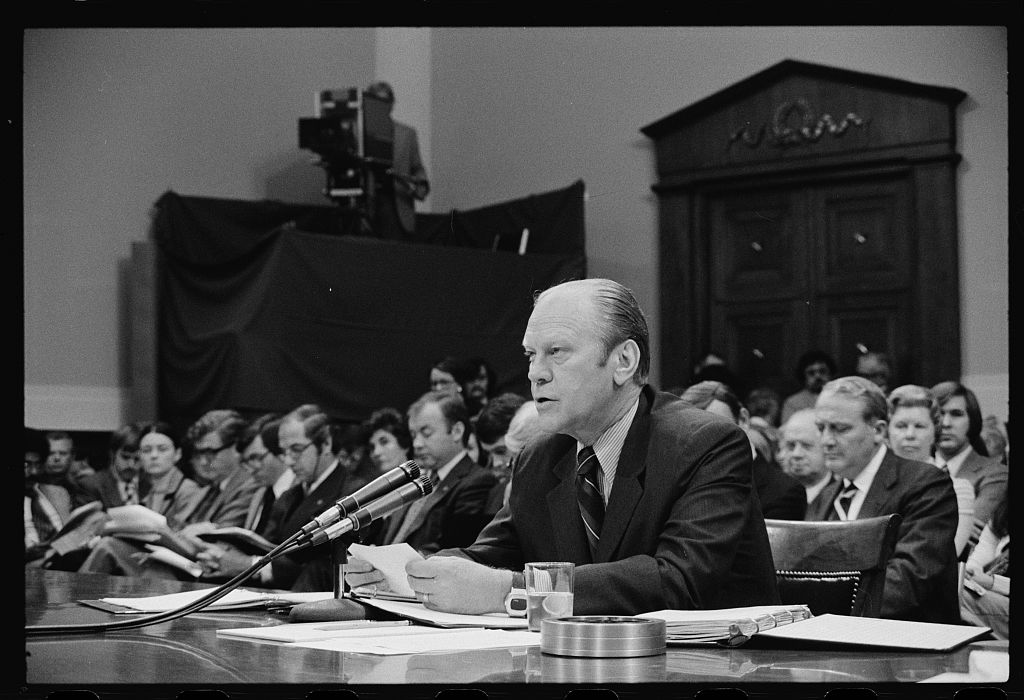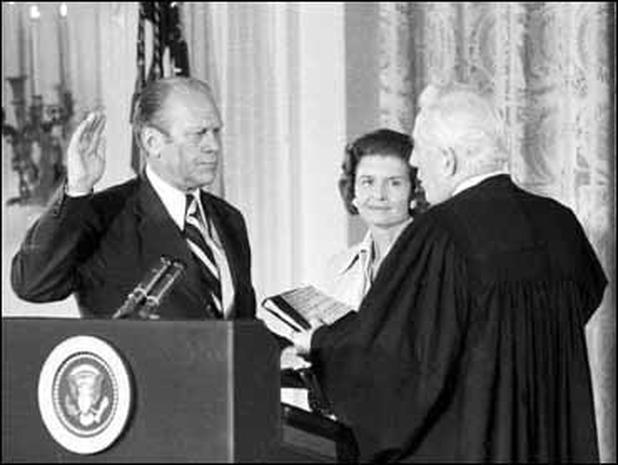By Kaleena Fraga
As a site dedicated to presidential history, we spend most—read, almost all—of our time talking about white men. The United States has only had one Black president and the stories from Barack Obama’s two terms are still so recent that they rarely make it onto this site. (Although we did enjoy writing about his colorful presidential portrait.)
That being said, we’re going to dedicate this post to Black History Month—February—and, specifically, the man considered to be the “Father of Black History”: Carter G. Woodson.
The History of Black History Month

So, first things first—and this will involve a few white presidents—how did Black History Month come into being?
Gerald Ford first recognized Black History Month in 1976, the nation’s bicentennial. Ford encouraged Americans to: “seize the opportunity to honor the too-often neglected accomplishments of Black Americans in every area of endeavor throughout our history.”
Subsequent presidents also acknowledged Black History Month and in 1986, Congress fortified it by law—calling upon the president to make an annual proclamation.
But presidents like Ford were only building on something that had been around for a long time—giving a platform to a movement that had begun in earnest at the beginning of the 20th-century.
Carter G. Woodson: The “Father of Black History”

Who was Carter G. Woodson, the “Father of Black History”? Born in 1875, the son of former slaves, Woodson chased every educational opportunity that he could find. After years of balancing his schooling with work, Woodson earned a Master’s degree from the University of Chicago and a Phd from Harvard University, both in history. During that time, Woodson noticed something peculiar and upsetting—a distinct lack of Black history in his curriculums.
To remedy this, Woodson—alongside the minister Jesse E. Moorland—founded the Association for the Study of Negro Life and History (now the Association for the Study of African American Life and History, or the ASALH) in 1915. Their organization sought to promote the study of Black history and celebrate Black accomplishments.
“If a race has no history, it has no worthwhile tradition, it becomes a negligible factor in the thought of the world, and it stands in danger of being exterminated,” Woodson noted.
In 1926, the group decided to promote their mission with the creation of “Negro History Week.” Woodson chose the second week in February to coincide with the birthdays of Frederick Douglass and Abraham Lincoln. Each year, the week would have a theme, which focused on topics like Black poetry, the addition of Black history to school curriculums, or a focus on Black luminaries like Douglass. This tradition continues to this day.
In his book, The Mis-Education of the Negro (1933), Woodson lay out his case for what was wrong with the current American education system. Education, he argued, was vital. “When you control a man’s thinking,” Woodson wrote, “you do not have to worry about his actions.” He pointed to the “mis-education” of Black people in America as a means of oppression. “The oppressor has always indoctrinated the weak with this interpretation of the crimes of the strong.”
Woodson faced a steep, uphill battle. By the 1960s, the most popular eighth-grade textbook included only two Black Americans’ names since the Civil War. Author James Baldwin noted that in his own schooling: “I began to be bugged by the teaching of American history because it seemed that that history had been taught without cognizance of my presence.”
Woodson would have sympathized. He noted: “Those who have no record of what their forebears have accomplished lose the inspiration which comes from the teaching of biography and history.” Representation in history is important.
This began to shift as the Civil Rights movement gained steam. A number of colleges and universities took Woodson’s Negro History Week and transformed it into Black History Month—which led to Ford’s address in 1976.
But the work is far from done.
—
White supremacy is, sadly, still a powerful presence in this country. Americans continue to grapple with issues like systemic racism, implicit biases, and even how we should evaluate our own history—looking at you, Confederate monuments.
Could transforming education change hearts and minds? Woodson thought so. He concluded that racial prejudice: “is merely the logical result of tradition, the inevitable outcome of thorough instruction to the effect that the Negro has never contributed anything to the progress of mankind.”
That is, the erasure of Black accomplishments and lives in the past has a devastating effect on the present.
America’s first Black president agreed with this. According to his memoirs, A Promised Land, Barack Obama saw representation as one of the defining reasons to run for president. As he talked over the possibility of a run with friends and family, Michelle Obama asked him: “Why do you need to be president?”

Obama said: “There’s no guarantee we can pull it off. [But] I know that the day I raise my right hand and take the oath to be president of the United States, the world will start looking at America differently. I know that kids all around this country—Black kids, Hispanic kids, kids who don’t fit in—they’ll see themselves differently, too, their horizons lifted, their possibilities expanded. And that alone…that would be worth it.”
Happy Black History Month! We may have only had one Black president, but the American presidency is packed—packed—with Black stories. We’ll try to do a better job of including more of those here.
Some recent books that History First enjoyed that tell Black stories:
A Promised Land by Barack Obama
Becoming by Michelle Obama
The Sword and the Shield by Peniel E. Joseph
And *anything anything anything* by James Baldwin.











 Ford and his family would not move to the White House until 10 days into his term, and in the meantime Ford would continue to commute from his home in Alexandria, Virginia. The
Ford and his family would not move to the White House until 10 days into his term, and in the meantime Ford would continue to commute from his home in Alexandria, Virginia. The  words…my fellow Americans, we have a lot of work to do.” To Congress he said, “I do not want a honeymoon with you. I want a good marriage.” Ford, who had climbed the ropes in Washington as a member of Congress, seemed uniquely able to build such a relationship. Yet he would veto 66 bills passed by the Democratic Congress, many of which were then overridden by Congress–the largest percentage of overrides since Congress overrode Andrew Johnson’s vetoes following his unexpected ascension to the presidency.
words…my fellow Americans, we have a lot of work to do.” To Congress he said, “I do not want a honeymoon with you. I want a good marriage.” Ford, who had climbed the ropes in Washington as a member of Congress, seemed uniquely able to build such a relationship. Yet he would veto 66 bills passed by the Democratic Congress, many of which were then overridden by Congress–the largest percentage of overrides since Congress overrode Andrew Johnson’s vetoes following his unexpected ascension to the presidency.